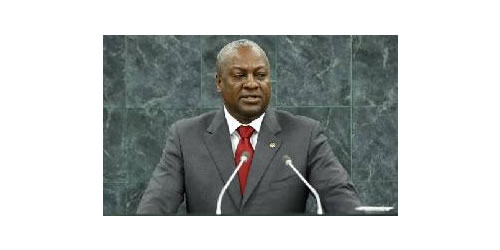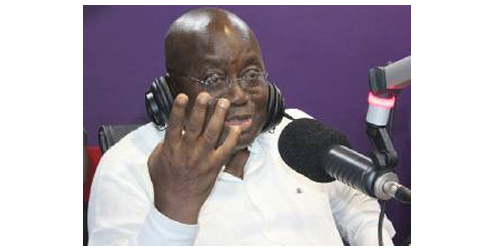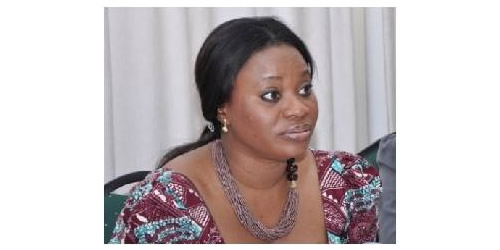Nana Addo opposes long-term Dev’t Plan – ISODEC

The long-term national development plan which is expected to be crafted after the National Development Planning Commission (NDPC) has completed its nationwide consultative process might not be implemented if the standard bearer of the New Patriotic Party (NPP), Nana Addo Danquah Akufo-Addo, emerges as the president of Ghana after 2016.
This was revealed by the Integrated Social Development Center (ISODEC), which claims that the NPP flag bearer is not in support of a national development plan.
Media and Campaign Co-ordinator for ISODEC, Dr Steve Manteaw, reveals that Nana Akufo-Addo is convinced a long-term development plan will return Ghana to what he terms, “socialist economic planning.”
“I am very much aware that the NPP flagbearer, Nana Akufo-Addo, does not buy into this idea. As at 2012, we had an encounter with him and he had convincing reason why we should not be governed by a long-term development plan.
“His view is that a long-term development plan for Ghana will return us to the command type of socialist economic planning and he thinks that people should be free to provide whatever manifesto they want to be guided by and carry it through,” Dr Manteaw noted.
Dr Manteaw, however, holds the view that a long-term development plan can work only if the plans are restricted to only broad national aspirations.
“I think what is being proposed is not a document that will be very detailed in terms of how this country must be governed. What is being proposed is a broad development framework that sets our national development priorities. You may want to liken this to the Millennium Development Goals or its successor programmes.
“So it sets the broad goal and then political competition will take place within that framework in terms of who has the best strategy to take this country to where we want to get to by 2040, the plan actually should be very broad,” he expatiates.
In a related development, NPP General Secretary, Mr Kwabena Agyei Agyepong has raised issues with the structure and number of members constituting the body that will shepherd the process, that is, the National Development Planning Commission (NDPC).
In respect of the structure, Mr Agyepong argues that it is not proper to have a Director General and Cabinet Ministers serving on one commission; hence he calls for a re-examination of the structure to see if it fits the purpose.
Additionally, he is of the view that the involvement of political appointees in the consultative process nationwide will not augur well for the work of the Commission since that has political ramifications.
He, therefore, proposes that the NDPC should to get in touch with experts in areas of development planning to discuss the way forward. He equally disagrees with the intended consultation exercise on the basis that there are copious development documents available which could be put together for review. Thus, the consultation exercise will only be superfluous and unnecessary cost to the State.
Besides, Mr Agyepong finds the number of Commissioners, which currently stands at 35, too wieldy for the effectiveness and efficiency of work, hence counterproductive and uneconomical. He contends that the rather huge number will create too much cost for the nation relative to meeting Commissioners’ allowances and feeding.
Last Tuesday, President John Dramani Mahama launched the national preparation of a long-term National Development Plan for Ghana and the Accra International Conference Centre. The plan 40-year plan spans 2018-2057. In attendance were the two former presidents, Jerry John Rawlings and John Agyekum Kufuor.
The NDPC was established under Articles 80 and 87 of the 1992 Constitution as part of the Executive. In accordance with the provision of Article 87, the core mandate of the Commission is to “advise the President on the development planning policy and strategy” and, “at the request of the President or Parliament, or on its own initiative do the following, among other things: study and make strategic analyses of macro-economic and structural reform options; and make proposals for the development of multi-year rolling plans taking into consideration the resource potential and comparative advantage of the different districts in Ghana.
The Constitution Review Commission (CRC) Report recommended the need for Ghana to have a long-term National Development Plan.
According the Report, which is a distillation of the views of Ghanaians, the long-term development plan should be national in character for the following reasons: that there is a blueprint for national progress and sustainable development; there is a framework for accelerated growth and actual reduction in poverty levels among Ghanaians; and ensure that national development is not centered on sectional political party manifestos; manifestos must rather be aligned to the plan, among other things.
Furthermore, the CRC Report also recommended that the plan should be binding on all successive governments. This was grounded on the following reasons: will ensure that projects initiated under a previous government are not abandoned when there is a change in government; ensure that national resources, annual budgets and government programmes, projects and initiatives are directed to realising the ends of the plan; and make it possible for any Ghanaian to enforce adherence to the plan by successive governments.
Source: Public Agenda




